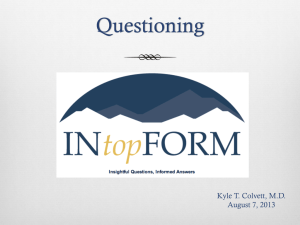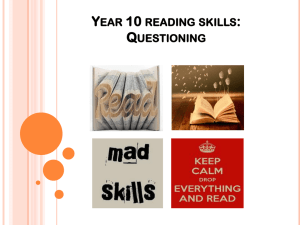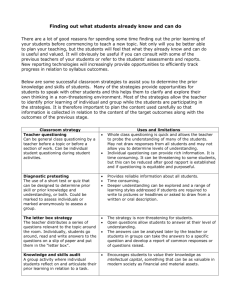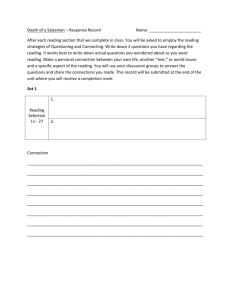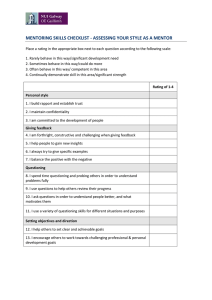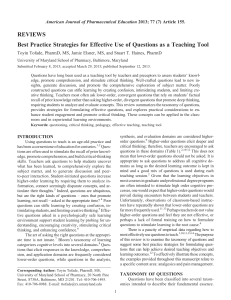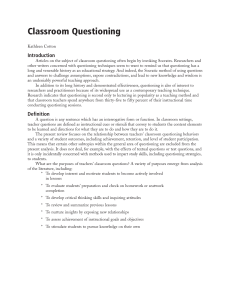Questioning for Higher Order Thinking
advertisement
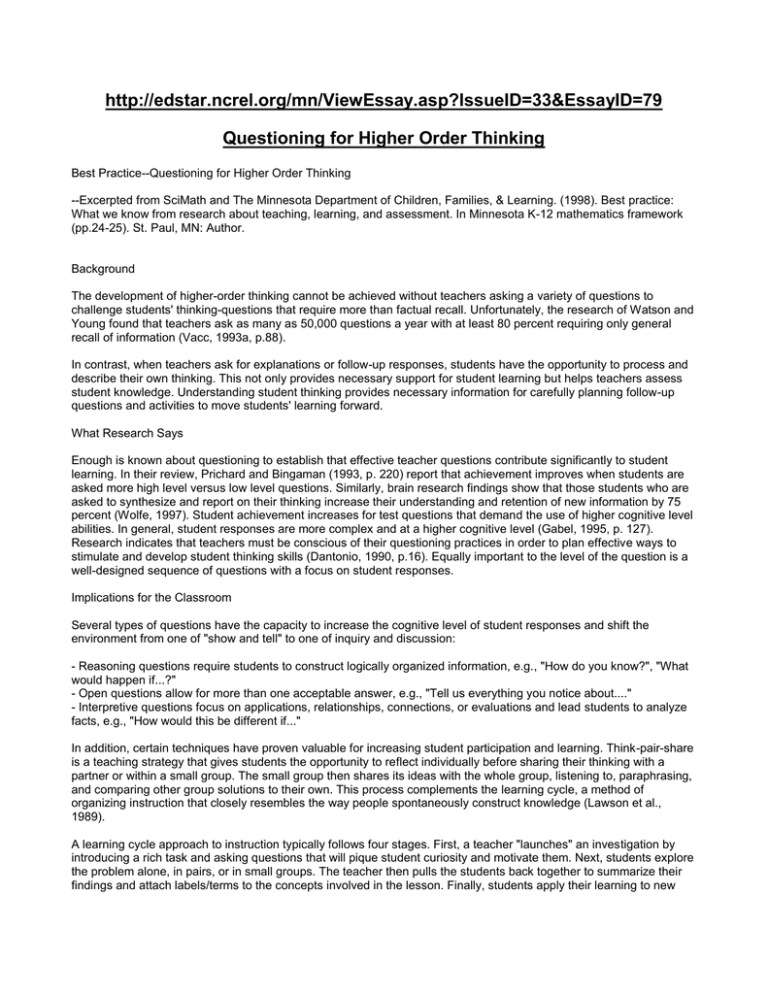
http://edstar.ncrel.org/mn/ViewEssay.asp?IssueID=33&EssayID=79 Questioning for Higher Order Thinking Best Practice--Questioning for Higher Order Thinking --Excerpted from SciMath and The Minnesota Department of Children, Families, & Learning. (1998). Best practice: What we know from research about teaching, learning, and assessment. In Minnesota K-12 mathematics framework (pp.24-25). St. Paul, MN: Author. Background The development of higher-order thinking cannot be achieved without teachers asking a variety of questions to challenge students' thinking-questions that require more than factual recall. Unfortunately, the research of Watson and Young found that teachers ask as many as 50,000 questions a year with at least 80 percent requiring only general recall of information (Vacc, 1993a, p.88). In contrast, when teachers ask for explanations or follow-up responses, students have the opportunity to process and describe their own thinking. This not only provides necessary support for student learning but helps teachers assess student knowledge. Understanding student thinking provides necessary information for carefully planning follow-up questions and activities to move students' learning forward. What Research Says Enough is known about questioning to establish that effective teacher questions contribute significantly to student learning. In their review, Prichard and Bingaman (1993, p. 220) report that achievement improves when students are asked more high level versus low level questions. Similarly, brain research findings show that those students who are asked to synthesize and report on their thinking increase their understanding and retention of new information by 75 percent (Wolfe, 1997). Student achievement increases for test questions that demand the use of higher cognitive level abilities. In general, student responses are more complex and at a higher cognitive level (Gabel, 1995, p. 127). Research indicates that teachers must be conscious of their questioning practices in order to plan effective ways to stimulate and develop student thinking skills (Dantonio, 1990, p.16). Equally important to the level of the question is a well-designed sequence of questions with a focus on student responses. Implications for the Classroom Several types of questions have the capacity to increase the cognitive level of student responses and shift the environment from one of "show and tell" to one of inquiry and discussion: - Reasoning questions require students to construct logically organized information, e.g., "How do you know?", "What would happen if...?" - Open questions allow for more than one acceptable answer, e.g., "Tell us everything you notice about...." - Interpretive questions focus on applications, relationships, connections, or evaluations and lead students to analyze facts, e.g., "How would this be different if..." In addition, certain techniques have proven valuable for increasing student participation and learning. Think-pair-share is a teaching strategy that gives students the opportunity to reflect individually before sharing their thinking with a partner or within a small group. The small group then shares its ideas with the whole group, listening to, paraphrasing, and comparing other group solutions to their own. This process complements the learning cycle, a method of organizing instruction that closely resembles the way people spontaneously construct knowledge (Lawson et al., 1989). A learning cycle approach to instruction typically follows four stages. First, a teacher "launches" an investigation by introducing a rich task and asking questions that will pique student curiosity and motivate them. Next, students explore the problem alone, in pairs, or in small groups. The teacher then pulls the students back together to summarize their findings and attach labels/terms to the concepts involved in the lesson. Finally, students apply their learning to new situations. Many new curriculum projects, in both mathematics and science, reinforce the learning cycle concept in their teacher support materials. The investigative nature of the tasks, supported by the questioning skills of the teacher, helps students develop and refine their thinking skills. Teachers are encouraged to pose questions which ensure worthwhile student activity and lead students to explore a concept or explain their thinking. Facilitating questioning and thinking skills in the classroom is an art that, with effort, develops over time. The following strategies can help teachers improve the effectiveness of their questioning interactions with students: - Use precise language - Acknowledge all responses - Paraphrase student responses to acknowledge them - Rephrase questions rather than repeat them - Use nonspecific praise sparingly - Acknowledge student performance by giving specific feedback - Ask students to "think about their thinking" - Encourage students to ask questions of you and other students - Consciously plan for productive interaction
